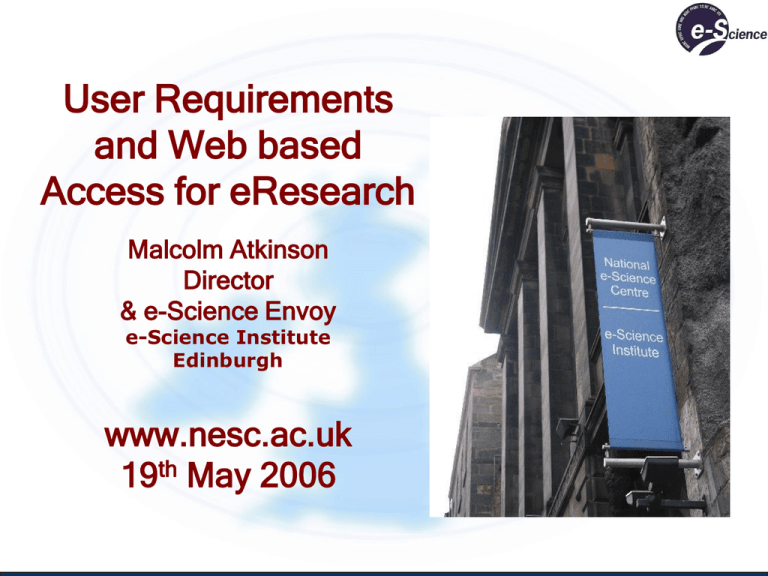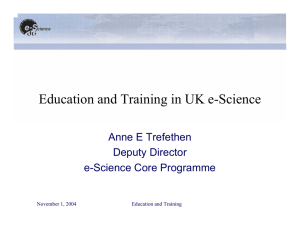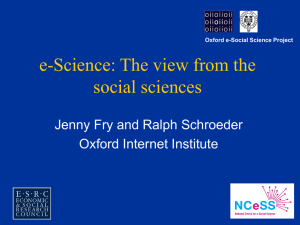User Requirements and Web based Access for eResearch www.nesc.ac.uk
advertisement

User Requirements and Web based Access for eResearch Malcolm Atkinson Director & e-Science Envoy e-Science Institute Edinburgh www.nesc.ac.uk 19th May 2006 Overview Introductions Questions Call to Action Goals of this meeting Two Hypotheses & a Principle Hypothesis 1 Many researchers in virtually all disciplines could benefit from e-Science methods and resources Hypothesis 2 The proportion of those researchers who actually benefit from e-Science methods and resources is very small indeed Principle We should find ways of rapidly and significantly increasing that proportion Why are so few infected by the e-Science meme Because the e-Science virus isn’t well adapted to its target hosts Probable forms of mal-adaptation Only the select few know about it The investment (time, learning, behaviour change) to use it is far too high It is far too risky “After I have spent time on finding out how to use it, it doesn’t deliver what is needed for my research, and I’ve a gap in publications & funding” “If I learn to use it, it might then disappear” “If I tell my research students to use it, it might change just when they need to use it to generate their results – indeed, experts say it will” New technologies have seriously damaged research and careers in the past, simply by distracting good researchers; the wise wait until calm has returned and the significant has emerged from the mere corroborative detail adding artistic verisimilitude If I work in this context I will not be able to publish or get funded because reviewers and readers will not understand what I did Proposed method Today Work with existing users to understand what works Today’s focus is those who use portals and perhaps find they work Understand why those things worked What facilities: services, data sources and tools were needed? How were they constructed, supplied and supported? Devise specific ways in which that success can be replicated for many more researchers More researchers in the same discipline What do we need to achieve this? More disciplines What is needed for each discipline? Can we amortise the costs across disciplines? Can we avoid reinforcing the disciplinary silos? Support new aspects of each discipline’s work Given limited resources, what should we do first. Method another day Work with people who have shown some interest and then chosen not to engage with e-Science methods and resources Understand why they chose not to engage What was the worry, risk or practical difficulty that stopped them? What facilities: services, data sources and tools were needed? Devise specific ways in which those impediments can be addressed Work with some of them to see if these ways are efficacious Given limited resources, what should we do first? Strategy Integrate understanding of Reasons users do not manage to gain benefits Approaches that work – why & how they work From multiple efforts to engage & learn At the same time Do the best we can NOW To improve the usability & accessibility Of e-Science methods and facilities Goals for Today Deliver a specific recommendation How to address usability using portals so that we significantly increase the take up of e-Science methods by researchers in a wide range of disciplines. What further meetings do we need in the next 12 months? Topics and participants To answer what critical question What are the immediate steps (n12m) we can take to improve access to e-Science? Building on current UK investment and programmes Addressing priority needs Using feasible resources What are the priorities? 1 to 3 year horizon. Disciplines & facilities Minimum resources and services to make significant progress How do we refine and socialise priorities? How do we engage more investment in improving access? The ultimate goal Democratised e-Research At universities In schools In companies At home Amateur research Understanding decisions Modelling personal / community options When Linda Snell uses the Grid we’re done! Agenda 10.00 Malcolm Atkinson: A road map for widening engagement in e-Research 10.20 Portals case studies 11.00 Coffee 11.15 Portals case studies 13.00 Lunch 14.00 Rob Procter: Selection of breakout discussion issues 14.15 Parallel breakout sessions 16.00 Jennifer Schopf: Feedback and close User/Developer Presentations 10.20 Discovery Net: Michelle Osmond 10.40 e-Minerals: Arnaud Marmier & Rob Allan 11.00 Coffee 11.20 GEMEDA: Simon Peters 11.40 myGrid: Paul Fisher & Robert Stephens 12.00 e-HTPX: David Meredith & Robert Esnouf

